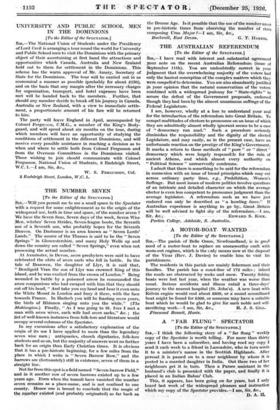THE NUMBER SEVEN
[To the Editor of the SPECTATOR.]
SIRS Will you permit me to use a small space in the Spectator with h request for some enlightenment to the origin of the Widespread use, both in time and space, of the number seven ? We hive the Seven Seas, Seven days of the week, Seven Wise Men,. witches' Seiren Strides, Seen-league boots, the Seventh son of a Seventh son, who probably hopes for the Seventh Heaven. On Dartmoor is an area known as " Seven Lords' Lands." The source of the Thames is said to be the " Seven Springs " in Gloucestershire, and many Holy Wells up and down the country are called " Seven Springs," even when not possessing the actual number.
At Axminster, in Devon, seven presbyters were said to have celebrated the obits of seven earls who fell in battle. In the tale of Branwen, the daughter of Llyr, it is said that, " Bendigeid Vran the son of Llyr was crowned King of this island, and he was exalted from the crown of London." Being wounded in battle by a poisoned arrow he commanded the seven companions who had escaped with him that they should cut off his head, " And take you my head and bear it even unto the White Mount in London and bury it there, with the face towards France. In Harlech you Will be feasting seven years, the birds of Rhinnon singing unto you the while." (The Mabinogion.) Finally, " As I was going to St. Ives I met a man with seven wives, each wife had seven sacks," arc. ; the list of well-known instances from folk-lore and literature would occupy several columns of the Spectator. .
In my excursions after a satisfactory explanation of the origin of its use I have applied to more than the legendary seven wise men ; antiquaries, church dignitaries, folk-lore students and so on, but the majority of answers went no farther back for an origin than Early Christian times. It is obvious that it has a pre-historic beginning, for a few miles from the place in which I write is " Seven Barrow Row," and the barrows are (fortunately) still in existence,; seven of them in a straight line.
Not far from this spot is a field named "Seven-barrow Field," and in it another row of seven barrows existed up to a few years ago. Even when the tumuli have vanished the number seven remains as a place-name, and is not confined to one county. Hence one is bound to conclude that the magic of *number existed (and probably originated) as far back as the Bronze Age. Is it possible that the use of the number arose in pre-historic times from observing the number of stars composing Ursa Major ?—I am, Sir, &c.,


































 Previous page
Previous page